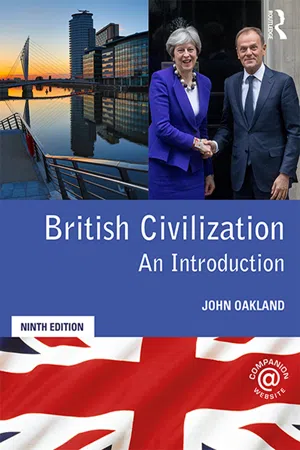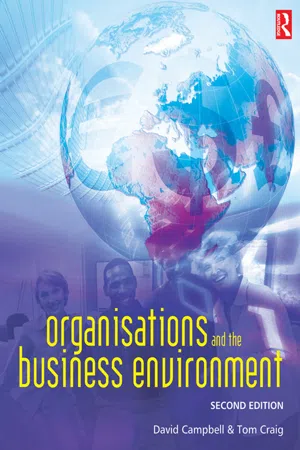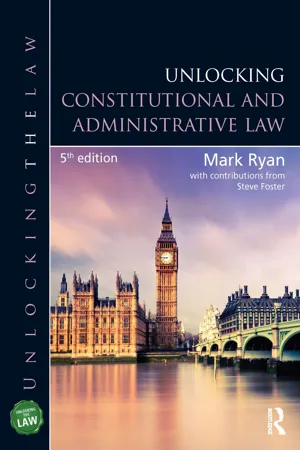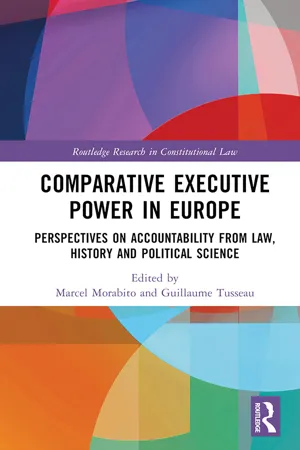Politics & International Relations
UK Government
The UK Government is the central authority responsible for making and implementing laws and policies in the United Kingdom. It consists of the executive, legislative, and judicial branches, with the Prime Minister serving as the head of government. The government operates within a constitutional monarchy framework, with the monarch as the ceremonial head of state.
Written by Perlego with AI-assistance
Related key terms
4 Key excerpts on "UK Government"
- eBook - ePub
British Civilization
An Introduction
- John Oakland(Author)
- 2019(Publication Date)
- Routledge(Publisher)
The powers of the state in many countries are defined and laid down in a written document (or constitution); are often classified as executive, legislative and judicial; relate to distinctive institutions (government, parliament and the judiciary respectively); and are separate. In Britain, however, there is no absolute separation of powers, for example between executive and legislature.Britain is sometimes described as a constitutional monarchy, where the monarch reigns as head of state without executive powers under constitutional limitations. It is also referred to as a parliamentary system, where the UK Parliament (consisting of the House of Commons, the House of Lords and formally the monarch) in London is the legislature and has traditionally possessed the supreme power to make laws in UK matters (until EU entry).The executive UK Government (sitting mainly in the House of Commons) governs by passing its policies (some of which are applicable throughout Britain) through Parliament as Acts of Parliament and operates through ministries or departments headed by ministers or secretaries of state. Within the government, a Cabinet consisting of leading ministers and headed by the Prime Minister, present draft legislation, which is presented to Parliament as the legislating body. The relationships between Prime Minister, Cabinet and Parliament can be combative and sometimes constitutionally unclear.The judicial branch is independent of the legislative and executive branches of government. The judges (judiciary) of the higher courts determine the law and interpret Acts of Parliament. The highest court of appeal for many matters in the UK is the Supreme Court, created in 2009. It also determines devolution disputes concerning England, Scotland, Wales and Northern Ireland.These branches, although distinguishable from each other, are not entirely separate. For example, the monarch is formally head of the executive, legislature and judiciary. A Member of Parliament (MP) in the House of Commons and a peer of the House of Lords may both be in the government of the day.These branches are supposed to operate according to the British constitution. But Britain has no written constitution contained in one document. Instead, the constitution consists of distinctive elements, most of which are in written form. These are statute law (Acts of Parliament), common law or judge-made case law, conventions (principles and practices of government which are not legally binding but have the force of law), documents such as Magna Carta, and EU law. - eBook - ePub
- Tom Craig, David Campbell(Authors)
- 2012(Publication Date)
- Routledge(Publisher)
Sub-national political influence arises from the actions and policies of the local authority that exercises power in the immediate vicinity of the business. In the UK, local authorities are subject to national government, based in Westminster. National government determines the policies that affect every business and each local authority. Supranational political influence is political policy that can affect many countries at the same time. For the UK, the principal supranational influence comes from the European Community (EC). The EC has certain powers over the UK state, but in other matters, the national government remains preeminent over national affairs.8.3 What Is the ‘State'?
A state (not to be confused with a ‘government’) is a self-governing, autonomous geographical region comprising a people with (usually) a common recent history. The state has the right to raise tax revenues from its people and exert the force of law over them. As a concept, a state has four distinct and separate components and states differ in how these ‘organs’ are set in place and how they are structured. The four organs are present in all cases. The components of a state are as follows:- The executive responsible for overseeing all other parts of the state, for policy-making and for proposing legislation to the legislature.
- The legislature responsible for drafting, debating and passing laws which will apply to the people of the state.
- The judiciary, an independent (by varying degrees) part of the state, responsible for enforcing both statute laws (passed by the legislature) and common law (law generally accepted but not recorded in statute).
- The secretariat responsible for carrying out the administration of the state through a number of departments, authorities and government agencies. (Note: Some textbooks subsume the secretariat into the executive.)
8.4 The State at National Level in the UK
The state in which the majority of readers of this book will reside or study is correctly called the (or Her Majesty’s) United Kingdom of Great Britain and Northern Ireland. This is shortened, for obvious reasons, to the United Kingdom or the UK. It is often the case that the full name is slightly different from the common name. Germany, for example, is formally referred to as the Bundesrepublik Deutschland - eBook - ePub
- Mark Ryan, Steve Foster(Authors)
- 2023(Publication Date)
- Routledge(Publisher)
- Government ministers.
- Central government departments.
- Executive agencies.
- Non-departmental public bodies.
- Non-ministerial departments.
- Local authorities.
- Devolved executive institutions.
ACTIVITY Quick quiz What do the following terms mean?- The Crown.
- The government.
- The executive.
11.2 The political executive/Her Majesty’s Government
11.2.1 The monarch
The political executive is constitutionally Her Majesty’s Government and ministers swear an oath of allegiance to the Crown. In practice, the monarch’s role is largely formal.On the monarchy, see A Hameed, ‘The monarchy and politics’ [2016] PL 401 and R Hazell and B Morris, The Queen at 90: The Changing Role of the Monarchy, and Future Challenges (The Constitution Unit, 2016).11.2.2 The Prime Minister
Although the monarch is the head of state and titular head of the executive, the Prime Minister is the effective head of government (contrast this with the position in the United States, where the elected President is both head of state and head of government). The constitutional office of the Prime Minister has developed historically by constitutional convention (contrast this with most other Prime Ministers/Presidents who owe their creation to a codified constitutional document) and is the head of the Cabinet (primus inter pares - eBook - ePub
Comparative Executive Power in Europe
Perspectives on Accountability from Law, History and Political Science
- Marcel Morabito, Guillaume Tusseau, Marcel Morabito, Guillaume Tusseau(Authors)
- 2023(Publication Date)
- Routledge(Publisher)
18I will not say much more about devolution below, but readers should know that everything I say about the United Kingdom government applies with more or less the same force to the governments of Northern Ireland, Scotland, and Wales.Summary
The best way to describe the Executive in the UK Constitution is to state that the Monarch is the Head of State, the Prime Minister is the Head of the Government – His Majesty’s Government – and the policies of the Government are carried into effect by ministers and civil servants.18 B. Hadfield, ‘Devolution: A National Conversation’, in The Changing Constitution, 7th edn, eds J. Jowell and D. Oliver (Oxford: Oxford University Press, 2011), p. 233.Parliament is supreme over the Executive and, as such, controls the statutory, prerogative, and administrative powers exercisable by ministers. These powers are exercised in substance by ministers and civil servants, even prerogative powers.Legal and Political Accountability
There are two leading perspectives on the British Constitution.19 One is primarily characterised by legal accountability. It emphasises the role of the courts in imposing constraints of law and due process on those in the political branches of government. A competing perspective is characterised by political accountability, which relies on individual interests and the public good being safeguarded by robust debate within the political process. On this view, constitutional principles, including fundamental rights, are protected by the proper operation of political institutions and public debate.Accountability in Action
This is quite abstract. Let us consider a recent concrete case, of the highest importance, in which both legal and political accountability played an important role. Indeed, that legal and political accountability were both to the forefront in the most recent major British constitutional collision – in the so-called Case of Prorogations
Index pages curate the most relevant extracts from our library of academic textbooks. They’ve been created using an in-house natural language model (NLM), each adding context and meaning to key research topics.



